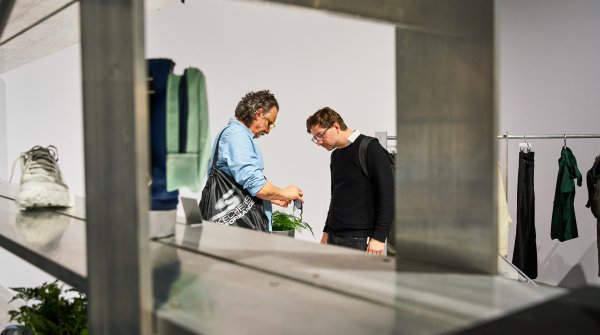
Around 40 percent of sales in the specialist sports retail sector are already generated online today. For a long time, this was mainly at the expense of bricks-and-mortar retail. But there is now a growing awareness that e-commerce and bricks-and-mortar retail go well together. In fact, they complement each other perfectly.
This is proven by retailers such as Keller Sports and Kickz, both of which are very successful with multichannel concepts. At the ISPO Digitize Summit, Marcus Trute, CEO of Keller Sports, and Christian Grosse, CEO of Kickz, talked about which strategies work and how to stay relevant in a business that is increasingly focused on the big players.
When Kickz's first streetwear store opened in Munich in 1993, the Internet was still in its infancy. Nevertheless, Christian Grosse was sure an online store was just the thing for his small, international target group. "Multichannel was important to us right from the start," says Grosse.
That's why the store fronts had Kickz.com on them from the start, and the stores were always used as warehouses as well. Today, online sales account for "significantly more than half," says Grosse, with a total of 15 stores in Germany. There are own online stores for the DACH region, the USA, France, UK, Sweden, Finland, Denmark, Norway, the Netherlands and Belgium. Kickz has been part of Zalando since 2017.
Two years after opening the first store, the Kickz team launched its own sneaker brand, K1x. Grosse: "It made sense for us because we were able to do that and were part of the scene ourselves and knew the lifestyle exactly. And of course it was great to start a brand and also have the sales channel for it right away."
In order to produce economically, K1x needed other retailers like Footlocker and Snipes. But they were wary and not easily convinced; after all, Kickz as a store was a competitor, even if the K1x brand would sell well. "It was difficult, but ultimately the pressure was so high that they couldn't get around it," Grosse says.
ISPO Digitize: Tag eins in Bildern
Keller Sports was founded in 2005 with the idea of establishing an online store for the premium segment. "At that time, we didn't see any premium retailers in the sports sector; there were only retailers for the mass market," explains Marcus Trute. Although there was Engelhorn Sport or Sport Conrad, "they came from the stationary business and didn't have any relevance online yet." The increasing verticalization in the sports business also made it clear that retailers would generally have problems in the future staying relevant for brands and getting the best products.
"We therefore took a close look at the brands and looked for ways to improve our position," Trute said. The result is multi-faceted: for example, a high-quality online store was designed with an elaborate product showcase. A premium membership with exclusive deals binds customers to the store, which has now also got a stationary offshoot for exclusive product launches and brand events.
A self-developed app allows customers to collect points for sporting activities and redeem them in the store - challenges are designed to motivate users to keep taking part. The latest coup: In July, the retailer launched a lifestyle store online under the name Keller X, thus expanding its target group.
"We therefore took a close look at the brands and looked for ways to improve our position," says Trute. The result is multifaceted: A high-quality online store was designed with an elaborate product presentation. A premium membership with exclusive deals binds customers to the store, which has now also been given a stationary offshoot for exclusive product launches and brand events.
A self-developed app allows customers to collect points for sporting activities and redeem them in the store - challenges are designed to motivate users to keep taking part. The latest coup: In July, the retailer launched a lifestyle store online under the name Keller X, thus expanding its target group.

For both retailers, the direct line to the customer is the key to success. "What doesn't work," says Grosse, "is differentiating yourself through prices or buying Adwords." Staying permanently relevant to the target group is a challenge, especially if it is young. Kickz invests a lot of manpower in content creation to supercharge its products and connect them to the right lifestyle. Digital tools for data generation don't help him much. Grosse: "Our customers are too young and change too quickly. More data on customer behavior wouldn't get us anywhere."
At Keller Sports, on the other hand, the evaluation of customer interests tipped the scales in terms of product range design. Running and tennis were set from the start, but which other categories could be added was determined by a customer survey. The surprising result was that there was no majority in favor of soccer.
Exclusivity plays an essential role in the competition for the favor of discerning customers - this applies to both retailers. But online stores in particular have problems implementing this. That's why Kickz and Keller Sports have found ways to artificially make their products scarcer. Keller Sports' brick-and-mortar store only opens for special occasions and focuses on very few products. Trute: "Square meter sales don't matter."
Instead, the community effect and the exclusive staging of product and brand count. When sneakerheads camp out in front of the store at Kickz to grab limited sneaker editions, it is clear to Kickz that these products have no place in the online store. "In this respect, the multichannel idea is already evolving again and moving away from total availability," says Grosse.

For both retailers, the direct line to the customer is the key to success. “What won’t work,” says Grosse, “is differentiating yourself through prices or buying Adwords.” Staying lastingly relevant for the target group is a challenge, especially when they are young. Kickz is investing a lot of manpower in content creation to charge up the products and connect them with the right lifestyle. Digital tools for data generation are of little help. Grosse: “Our customers are too young and they’re changing too quickly. More data on customer behavior wouldn’t get us any further.”
At Keller Sports, on the other hand, the evaluation of customer interests was the decisive factor for the product range design. Running and tennis were set from the beginning; what other categories could be added were determined by a customer survey. The surprising result: Soccer did not get a majority.
Exclusivity plays a key role in the competition for the favor of discerning customers – this is true both retailers. But online stores in particular have problems implementing them. That’s why Kickz and Keller Sports found ways to artificially make their products run short. Keller Sports’ stationary store only opens for special events, and concentrates on a very select few products. Trute: “The square meter turnover doesn’t matter.”
What counts instead is the community effect and the exclusive staging of product and brand. If Kickz has sneakerheads camping in front of the store to get limited sneaker editions, it’s clear to Kickz that these products have no business in the online store. “In this respect, the multichannel idea is already developing again and is moving away from total availability,” says Grosse.
- ISPO awards
- Mountain sports
- Bike
- Design
- Retail
- Fitness
- Health
- ISPO Job Market
- ISPO Munich
- ISPO Shanghai
- Running
- Brands
- Sustainability
- Olympia
- OutDoor
- Promotion
- Sports Business
- ISPO Textrends
- Triathlon
- Water sports
- Winter sports
- eSports
- SportsTech
- OutDoor by ISPO
- Heroes
- Transformation
- Sport Fashion
- Urban Culture
- Challenges of a CEO
- Trade fairs
- Sports
- Find the Balance
- Product reviews
- Newsletter Exclusive Area
- Magazine




































